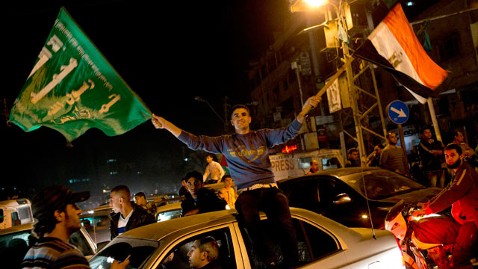CAIRO (Reuters) - Egyptian President Mohamed Mursi faced a rebellion from judges who accused him on Saturday of expanding his powers at their expense, deepening a crisis that has triggered violence in the street and exposed the country's deep divisions.
The Judges' Club, a body representing judges across Egypt, called for a strike during a meeting interrupted with chants demanding the "downfall of the regime" - the rallying cry in the uprising that toppled Hosni Mubarak last year.
Mursi's political opponents and supporters, representing the divide between newly empowered Islamists and their critics, called for rival demonstrations on Tuesday over a decree that has triggered concern in the West.
Issued late on Thursday, it marks an effort by Mursi to consolidate his influence after he successfully sidelined Mubarak-era generals in August. The decree defends from judicial review decisions taken by Mursi until a new parliament is elected in a vote expected early next year.
It also shields the Islamist-dominated assembly writing Egypt's new constitution from a raft of legal challenges that have threatened the body with dissolution, and offers the same protection to the Islamist-controlled upper house of parliament.
Egypt's highest judicial authority, the Supreme Judicial Council, said the decree was an "unprecedented attack" on the independence of the judiciary. The Judges' Club, meeting in Cairo, called on Mursi to rescind it.
That demand was echoed by prominent opposition leader Mohamed ElBaradei. "There is no room for dialogue when a dictator imposes the most oppressive, abhorrent measures and then says 'let us split the difference'," he said.
"I am waiting to see, I hope soon, a very strong statement of condemnation by the U.S., by Europe and by everybody who really cares about human dignity," he said in an interview with Reuters and the Associated Press.
More than 300 people were injured on Friday as protests against the decree turned violent. There were attacks on at least three offices belonging to the Muslim Brotherhood, the movement that propelled Mursi to power.
POLARISATION
Liberal, leftist and socialist parties called a big protest for Tuesday to force Mursi to row back on a move they say has exposed the autocratic impulses of a man once jailed by Mubarak.
In a sign of the polarization in the country, the Muslim Brotherhood called its own protests that day to support the president's decree.
Mursi also assigned himself new authority to sack the prosecutor general, who was appointed during the Mubarak era, and appoint a new one. The dismissed prosecutor general, Abdel Maguid Mahmoud, was given a hero's welcome at the Judges' Club.
In open defiance of Mursi, Ahmed al-Zind, head of the club, introduced Mahmoud by his old title.
The Mursi administration has defended the decree on the grounds that it aims to speed up a protracted transition from Mubarak's rule to a new system of democratic government.
Analysts say it reflects the Brotherhood's suspicion towards sections of a judiciary unreformed from Mubarak's days.
"It aims to sideline Mursi's enemies in the judiciary and ultimately to impose and head off any legal challenges to the constitution," said Elijah Zarwan, a fellow with The European Council on Foreign Relations.
"We are in a situation now where both sides are escalating and its getting harder and harder to see how either side can gracefully climb down."
ADVISOR TO MURSI QUITS
Following a day of violence in Cairo, Alexandria, Port Said and Suez, the smell of tear gas hung over the capital's Tahrir Square, the epicentre of the uprising that toppled Mubarak in 2011 and the stage for more protests on Friday.
Youths clashed sporadically with police near the square, where activists camped out for a second day on Saturday, setting up makeshift barricades to keep out traffic.
Al-Masry Al-Youm, one of Egypt's most widely read dailies, hailed Friday's protest as "The November 23 Intifada", invoking the Arabic word for uprising.
But the ultra-orthodox Salafi Islamist groups that have been pushing for tighter application of Islamic law in the new constitution have rallied behind Mursi's decree.
The Nour Party, one such group, stated its support for the Mursi decree. Al-Gama'a al-Islamiya, which carried arms against the state in the 1990s, said it would save the revolution from what it described as remnants of the Mubarak regime.
Samir Morkos, a Christian assistant to Mursi, had told the president he wanted to resign, said Yasser Ali, Mursi's spokesman. Speaking to the London-based Asharq Al-Awsat newspaper, Morkos said: "I refuse to continue in the shadow of republican decisions that obstruct the democratic transition".
Mursi's decree has been criticized by Western states that earlier this week were full of praise for his role in mediating an end to the eight-day war between Israel and Palestinians.
"The decisions and declarations announced on November 22 raise concerns for many Egyptians and for the international community," State Department spokeswoman Victoria Nuland said.
The European Union urged Mursi to respect the democratic process.
(Additional reporting by Omar Fahmy, Marwa Awad, Edmund Blair and Shaimaa Fayed and Reuters TV; Editing by Jon Hemming)












